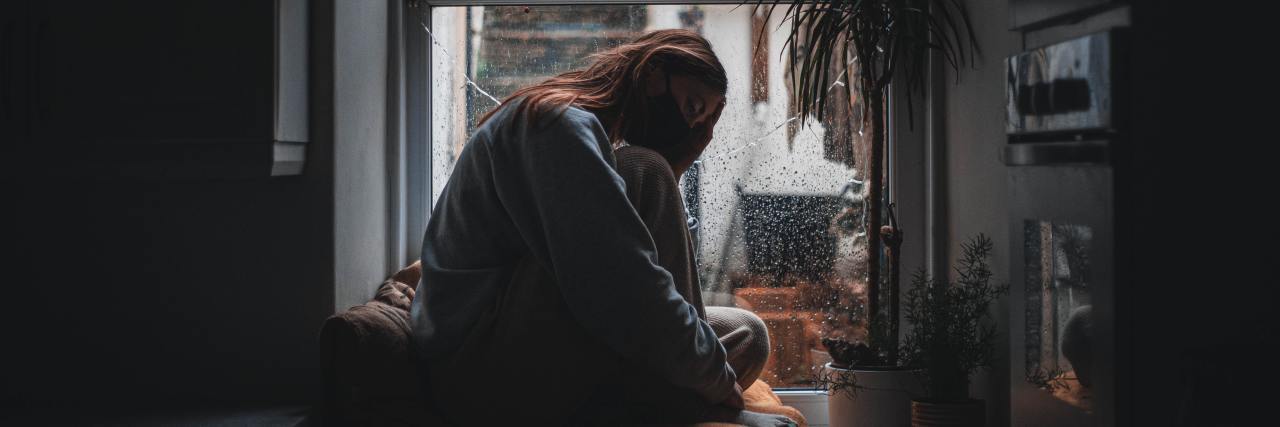My OCD Isn’t a Cute Quirk or T-Shirt Slogan
Editor's Note
If you struggle with obsessive-compulsive disorder (OCD), the following post could be potentially triggering. You can contact the Crisis Text Line by texting “START” to 741-741. To find help, visit the International OCD Foundation’s website.
I do not remember the exact moment I developed obsessive-compulsive disorder (OCD) only brief and fractured snippets like a broken movie reel. Except, it was not a movie as I had so desperately hoped for it to be — a nightmare I could possibly walk away from. No, this was a deeply embedded root, slowly taking hold of my body and my mind until I was unable to differentiate myself from my thoughts.
OCD is not a cute quirk, nor is it something everyone has a “touch” of. It is not perfectly aligned pencil cases, color-coordinated closets, or a feeling of needing your surroundings to be clean. It is a monster that lurks in the shadows, whispering that all you love and hold dear will be taken from you in an instant if you do not perform its ritual of release. And even then, the ritual only brings temporary ease until it begins its infinite cycle of taunts and demands.
To be technical, as defined by The American Psychiatric Association: “Obsessive-compulsive disorder (OCD) is a disorder in which people have recurring, unwanted thoughts, ideas or sensations (obsessions) that make them feel driven to do something repetitively (compulsions).” And the current diagnostic criteria requires: “the presence of obsessions and/or compulsions that are time-consuming (more than one hour a day), cause significant distress, and impair work or social functioning.” There are a few types of OCD including harm/doubt; Perfection; The most commonly known and wildly misrepresented, contamination; and forbidden/religious OCD.
It begins with something simple and does not necessarily come with a trigger or warning. We may be thinking about our daily to-do list or the soft feel of freshly washed sheets as we tuck in for the night. The next thing we know, we are imagining ourselves stabbing a loved one. We panic. Not only are we horrified that something like this could cross our mind so vividly, but we have to figure out how to stop ourselves from doing it because we wholeheartedly believe having this thought means it will come to fruition.
For me, this looked like repetitive and specific prayers. I would lock myself in a closet and tightly shut my eyes, repeating these prayers over and over until I’ve said them to myself 10 times. I felt tainted, evil. When I finally told my therapist about it and learned I was not, in fact, a secret serial killer, my reactions to these thoughts started to shift. Instead of locking myself away, I spent hours online reading about OCD to seek reassurance by reminding myself it was my obsessions/compulsions instead of something sinister lurking beneath the surface. Or I would refuse to use knives while working in the kitchen — even though I had learned about OCD, I still felt as though something would happen at any moment. Then when I developed a chronic illness, every new symptom became a fixation and I knew one of them would be the death of me unless I took my medication and supplements at a specific time — counting and recounting each pill while saying “feelings are not fact,” as I rubbed my thumb over them until I finally thought I might be OK.
Before intense exposure therapy, OCD debilitated me. I would beg my husband to stay home from work because I thought my thoughts would lead me to hurt myself even though suicide, as another obsession, terrified me to the bone. I was unable to leave my apartment or talk to my extended family in the fear someone would realize I was a dangerous imposter. So no, OCD is not something to be flippant about or a cute saying to put on a t-shirt. It is a real and debilitating condition that affects millions of people. And each time someone says something like that, we retreat further into ourselves because we know people will not be open to understand what we really go through.
If this information is completely new to you, I hope it has opened your eyes to the reality of obsessive-compulsive disorder. And if you know someone who has it, I hope this helps you have a little more compassion towards them, because they are suffering more than you are probably aware of. I promise, I’m not pointing the finger at you; I know how easy it is to be caught up in jokes, for them to be so deeply ingrained in us that we do not even realize what we are doing. I only seek awareness for something terribly misunderstood, and to be a voice for people just like me who have been too afraid to publicly discuss it.
And to those who have it, you are not alone. I know you feel that way in the isolation OCD can cause, especially when it tells you that you are “crazy” or that you should stay away from other people. Nor are you your thoughts and your anxiety. What you are is a deeply loving and caring person who would do anything to protect those around you. Please take a moment to check out support groups offered virtually or locally through the International OCD Foundation to find your people because we’re here, ready to root for you through your struggles.
Photo by Hedgehog Digital on Unsplash

